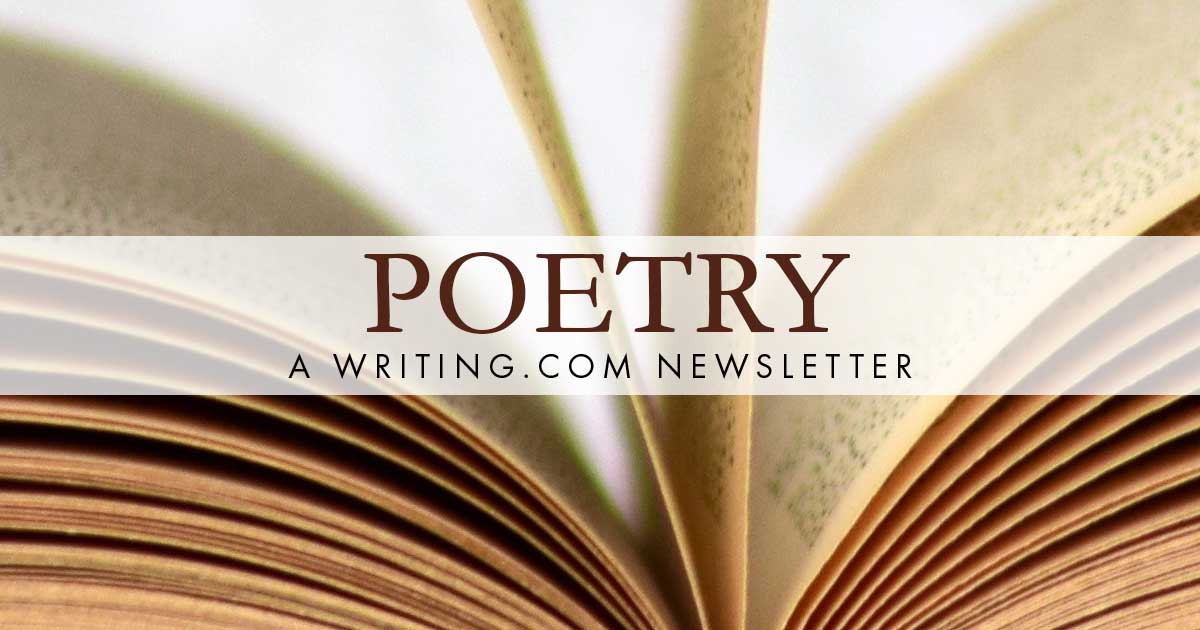This week: Tell Me a (Poetry) Story Pt 2 Edited by: Red Writing Hood <3  
More Newsletters By This Editor 
![Table of Contents [#401437]
Table of Contents](https://www.Writing.Com/main/trans.gif) ![Table of Contents [#401437]
Table of Contents Table of Contents](/main/images/action/display/ver/1709303267/item_id/401437.png)
1. About this Newsletter
2. A Word from our Sponsor
3. Letter from the Editor
4. Editor's Picks
5. A Word from Writing.Com
6. Ask & Answer
7. Removal instructions
![About This Newsletter [#401439]
About This Newsletter](https://www.Writing.Com/main/trans.gif) ![About This Newsletter [#401439]
About This Newsletter About This Newsletter](https://www.writing.com/main/images/action/display/ver/1709303676/item_id/401439.png)
"Poetry is when an emotion has found its thought and the thought has found words."
Robert Frost
"There is not a particle of life which does not bear poetry within it."
Gustave Flaubert
|
![Word from our sponsor [#401440]
Word from our sponsor](https://www.Writing.Com/main/trans.gif) ![Word from our sponsor [#401440]
Word from our sponsor Word from our sponsor](https://www.writing.com/main/images/action/display/ver/1709303724/item_id/401440.png)
| ASIN: B01MQP5740 |
Product Type: Kindle Store
|
|
Amazon's Price: $ 4.99
|
|
![Letter from the editor [#401442]
Letter from the editor](https://www.Writing.Com/main/trans.gif) ![Letter from the editor [#401442]
Letter from the editor Letter from the editor](https://www.writing.com/main/images/action/display/ver/1709303784/item_id/401442.png)
Tell Me a (Poetry) Story Pt 2
Once upon a time there lived a beautiful princess. She learned to bake sweet treats for the townspeople and everyone was very happy. Then one day her chariot crashed and she couldn’t remember how to bake anymore. This made the princess unhappy. This made her parents unhappy, and this made the townspeople unhappy. One day….
For millennia people have been using stories to pass on information, to share histories or to entertain. This includes in the form of poetry. Today I want to share a few ways to tell these poetry stories.
Collaborations
--Find a friend and create a poetry story together (assign parts, brain storm the whole thing together, etc).
--Find a poetry friend, or several, and take turns telling parts of this poetic story (like the campfire creatives found here at WDC).
Use a Poetry Form
In part 1 I shared fables and landays, but there are other poetry forms that utilize storytelling.
--Ballads
--Epic
--Idyll
--Lay
--Ode
Don’t Use a Poetry Form
Just tell your story, and don’t worry about using a form specifically used for stories. However, you’ll want to be sure your poem has the elements of a story:
--Characters
--Plot
--Setting
SOURCE NOTES:
The New Princeton Encyclopedia of Poetry and Poetics. Edited by Ales Preminger and T. V. F. Brogan. 1993.
Drury, John. the po.e.try dic.tion.ar.y. 2nd edition. Cincinnati: Writer's Digest Books, 2006. Print.
Turco, Lewis. The Book of Forms. 3rd. Lebanon, New Hampshire: University Press of New England, 2000.
Williams, Miller (1986). Patterns of Poetry: An Encyclopedia of Forms. Baton Rouge, Louisiana: Louisiana State University Press.
** Image ID #645115 Unavailable **
|
![Editor's Picks [#401445]
Editor's Picks](https://www.Writing.Com/main/trans.gif) ![Editor's Picks [#401445]
Editor's Picks Editor's Picks](https://www.writing.com/main/images/action/display/ver/1709303830/item_id/401445.png)
![Word From Writing.Com [#401447]
Word from Writing.Com](https://www.Writing.Com/main/trans.gif) ![Word From Writing.Com [#401447]
Word from Writing.Com Word from Writing.Com](https://www.writing.com/main/images/action/display/ver/1709303874/item_id/401447.png)
Have an opinion on what you've read here today? Then send the Editor feedback! Find an item that you think would be perfect for showcasing here? Submit it for consideration in the newsletter!
https://www.Writing.Com/go/nl_form
Don't forget to support our sponsor!
| ASIN: 0997970618 |
|
|
Amazon's Price: $ 14.99
|
|
![Ask & Answer [#401448]
Ask & Answer](https://www.Writing.Com/main/trans.gif) ![Ask & Answer [#401448]
Ask & Answer Ask & Answer](https://www.writing.com/main/images/action/display/ver/1709303902/item_id/401448.png)
Have a question, answer, problem, solution, tip, trick, cheer, jeer, or extra million lying around?
If so, send it through the feedback section at the bottom of this newsletter OR click the little envelope next to my name Red Writing Hood <3   and send it through email. and send it through email.
Comments on last month's newsletter:
From: Kate - Writing & Reading 
Comment: Thank you. What better time to incite poetic license than National Poetry Month. Intriguing examples, variations on both structured and non-form poetry - I will definitely try the haibun, and I'm especially intrigued by 'mish mash'.
From: Seabreeze 
Comment: How about the sestina poem? Could someone address it or if you have in the past, direct me to the newsletter. Below I have added mine for consideration. Thanks, Seabreeze
Suggested Item: "A Red Rose"  [E] [E]
Here are some previous newsletters that have talked about the sestina:
https://www.writing.com/main/newsletters/action/archives/id/4785-Strange-Loops.h...
https://www.writing.com/main/newsletters/action/archives/id/3179-.html
https://www.writing.com/main/newsletters/action/archives/id/1686-.html
https://www.writing.com/main/newsletters/action/archives/id/675-.html
|
![Word from our sponsor [#401440]
Word from our sponsor](https://www.Writing.Com/main/trans.gif) ![Word from our sponsor [#401440]
Word from our sponsor Word from our sponsor](https://www.writing.com/main/images/action/display/ver/1709303724/item_id/401440.png)
| ASIN: B07RKLNKH7 |
Product Type: Kindle Store
|
|
Amazon's Price: Price N/A
|
|
![Unsubscribe [#401452]
Removal Instructions](https://www.Writing.Com/main/trans.gif) ![Unsubscribe [#401452]
Removal Instructions Removal Instructions](https://www.writing.com/main/images/action/display/ver/1709303960/item_id/401452.png)
To stop receiving this newsletter, click here for your newsletter subscription list. Simply uncheck the box next to any newsletter(s) you wish to cancel and then click to "Submit Changes". You can edit your subscriptions at any time.
|
